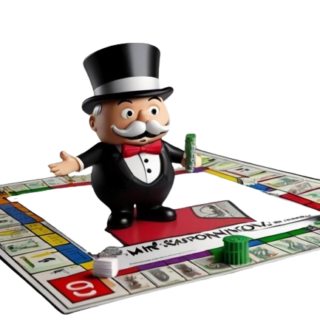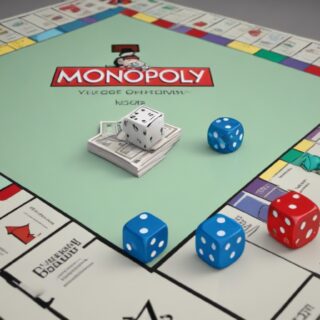Mastering Monopoly: Understanding the Bid Rules
Auctioning properties in Monopoly is not just a matter of chance—it’s an art form that can significantly impact your path to victory. Understanding the nuances of the auction rules can turn the tide in your favor and add a thrilling dimension to your gameplay. Here’s a comprehensive guide to mastering the auction in Monopoly:
In Monopoly, as in life, strategic choices and calculated risks can turn the tides of fortune.
Embracing the Auction
- Unowned Properties: When a player declines to purchase an unowned property, it triggers an auction. All players, including the one who declined, can bid on the property.
- Mortgaged Properties: In dire financial straits, players may need to mortgage properties. These properties can also be auctioned off to the highest bidder.

The Dance of Bidding
- Commencing the Auction: The auctioneer, typically the player to the left of the one who declined to purchase, starts the bidding at any amount.
- Bidding Increments: Bids must be in increments of at least $1.
- No Passing: Once a player makes a bid, they cannot pass on subsequent bids. They must either bid higher or bow out of the auction.
- Victory in Auction: The highest bidder wins the auction, pays the bid amount to the bank, and gains possession of the property.
Strategic Brilliance
- Financial Prudence: A strategic approach requires judicious cash management. Bid aggressively on properties that align with your strategy, but beware of overspending.
- Property Value: Consider the long-term value of the property when deciding your bid. Properties that complete color sets or offer high rent potential may warrant a higher bid.
- Reading the Room: Observe how other players are bidding. Their actions can provide insights into the perceived value of the property.
House Rules and Creativity
- House Rules: Some variations of Monopoly may have unique auction rules, such as setting a starting bid or allowing players to pass on bidding. Ensure everyone is clear on the rules before beginning the game.
Conclusion: Mastery through Auction
Mastering the art of auction in Monopoly can transform you into a formidable player, capable of seizing opportunities and outmaneuvering opponents. By understanding the rhythm of bidding, strategizing your moves, and adapting to house rules, you can elevate your gameplay and stake your claim as a Monopoly virtuoso.
What comes with the game
Here’s a table outlining the components included in a standard Monopoly game:
| Component | Description |
|---|---|
| Game Board | The board consists of 40 spaces representing properties, railroads, utilities, and special spaces like Chance and Community Chest. Players move around the board buying properties and collecting rent. |
| Tokens | Tokens represent players on the board and include classic items like the thimble, top hat, and car. Players choose a token at the beginning of the game. |
| Money | Monopoly money comes in different denominations and is used to buy properties, pay rent, and manage finances throughout the game. |
| Property Deeds | Deeds represent ownership of properties and include information such as purchase price, rent cost, and building costs. Players collect deeds when they buy properties. |
| Houses and Hotels | Players can purchase houses and hotels to increase rent on their properties. Houses are placed on properties to indicate rent increases, and hotels replace houses for higher rent. |
| Chance and Community Chest | These cards are drawn when a player lands on the corresponding space. They contain instructions that can be beneficial or detrimental to the player, such as paying or receiving money, or moving to a different space on the board. |
| Dice | Monopoly uses two six-sided dice for movement around the board. Players roll the dice to determine how many spaces to move on their turn. |
| Banker’s Tray | The banker manages the game’s money and properties. The banker’s tray includes compartments for the different denominations of money and property deeds. |
| Rules | The rulebook outlines how to play the game, including setup, gameplay, and winning conditions. It also includes information on optional rules and variations. |
| Mortgaged Property Cards | When a property is mortgaged, a card is placed on the property to indicate that it cannot collect rent until the mortgage is paid off. Players can mortgage properties to raise funds. |
| Houses and Hotels Tokens | These tokens are used to represent houses and hotels when purchased by players. They are placed on properties to indicate the level of development and the increased rent value. |
FAQ
In Monopoly, when a player declines to purchase an unowned property or cannot afford to pay a debt, the property goes up for auction. Players take turns bidding on the property until the highest bidder wins.
Yes, in Monopoly, players may auction off mortgaged properties if they cannot afford to pay debts or purchase properties. The highest bidder in the auction gains ownership of the property.
In a Monopoly auction, the auctioneer (usually the player to the left of the one who declined to purchase) starts the bidding at any amount they choose.
To win an auction in Monopoly, you must be the highest bidder when the bidding concludes. The highest bidder pays the bid amount to the bank and gains ownership of the property.
Yes, strategic bidding in Monopoly involves careful cash management, assessing the long-term value of properties, and reading the actions of other players to gauge the perceived value of the property
Ready to roll the dice and take on the challenge of becoming the ultimate property tycoon?
Set up the board, and let the wheeling and dealing begin!
Time to buy, sell, and trade your way to victory in the timeless game of Monopoly.
Who will build the biggest empire and bankrupt their opponents? Find out now by starting your Monopoly adventure


